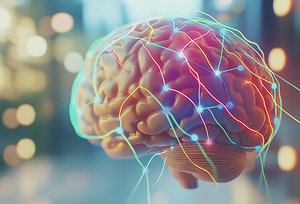Treat Your Brain Like a Muscle: Exercise It
By Editorial Staff
Anatomically, your brain isn't a muscle; although it contains a bit of muscle, it's predominantly gray and white matter, with cellular structure and function far different (and more complex) than that of muscle. However, there's good reason why many people compare the brain to muscle – in both cases, the "Use it or lose it" principle applies.
Evidence suggests mental stimulation improves brain function and reduces the risk of cognitive decline and related diseases. Mental stimulation or "exercise" helps the brain grow stronger, faster and better able to complete the millions of daily tasks it is charged with, from memory to problem solving to attention; not to mention controlling every aspect of the rest of the body. Here are a few easy ways to exercise your brain every day:
1. Start a good conversation: It sounds too good to be true, but an engaging conversation is great exercise for the brain. Of course, some conversations are better than others for this purpose - talking to a friend about how great "The Bachelor" was last night is probably going to prove a lot less mentally stimulating than debating the pros and cons of "Obamacare" or brainstorming solutions to a challenging life problem.
2. Read a good book: Don't tell us that our world of tablets, smartphones and 300-channel cable packages has stripped us of our love of reading, because a good book is another great way to exercise your brain. Reading a book not only stimulates the brain by forcing it to analyze words, sentence structure and storyline; it also stimulates our imagination because as we read, our brain makes mental images that explain the story.
 3. Play games: No, we're not talking about "Call of Duty" or "Angry Birds," although video games that require you to strategize and otherwise figure out how to accomplish a goal can prove brain stimulating; we're talking about "Old School" games, particularly endeavors like crossword puzzles, chess, cryptograms, etc., that require problem-solving. Faced with a problem, the brain is forced to consider various solutions, whether it be which word to choose, which move to make, etc. That thinking process is the perfect exercise to engage the brain.
3. Play games: No, we're not talking about "Call of Duty" or "Angry Birds," although video games that require you to strategize and otherwise figure out how to accomplish a goal can prove brain stimulating; we're talking about "Old School" games, particularly endeavors like crossword puzzles, chess, cryptograms, etc., that require problem-solving. Faced with a problem, the brain is forced to consider various solutions, whether it be which word to choose, which move to make, etc. That thinking process is the perfect exercise to engage the brain.
4. Work with numbers: Unless you're an accountant, engineer, contractor or math teacher by trade, you've probably forgotten more math than you remember. That's a shame, not only from a practical perspective, but also from a brain health standpoint. The solution is to keep your brain focused on numbers. Replace the calculator with your brain the next time you need to multiple $134 by 6 or 12 feet by 9 feet. Challenge your brain (and yourself) to come up with the right answer – and then check it with the calculator, just to be sure!
5. Don't stop learning: What happens when you stop exercising? Eventually, you lose your muscle strength, size and endurance. That's called atrophy, and it applies to your brain as well. It's said that Albert Einstein had a prodigious brain (at least certain parts of it), which not only explains his contributions to physics, but also makes perfect sense in our analogy – he "exercised" his brain all the time. Dedicate yourself to doing the same by committing yourself to lifelong learning. Pick a second language, download a "word of the day" list onto your phone, taking continuing-education classes on subjects that interest you; challenge yourself and your brain every day.
The male sexual organ - penis is also a muscle. It is also necessary to strengthen and stretch. But for more effective treatment or prophylaxis erectile dysfunction buy cialis. This drug contains the active substance Tadalafil. Each tablet contains 2.5, 5, 10, or 20 mg of tadalafil.
By the way, there are countless other ways to maximize brain health, including proper nutrition, adequate sleep and exercise (your entire body, not just your brain). Talk to your doctor for more information and start unlocking the full potential of your brain today.

